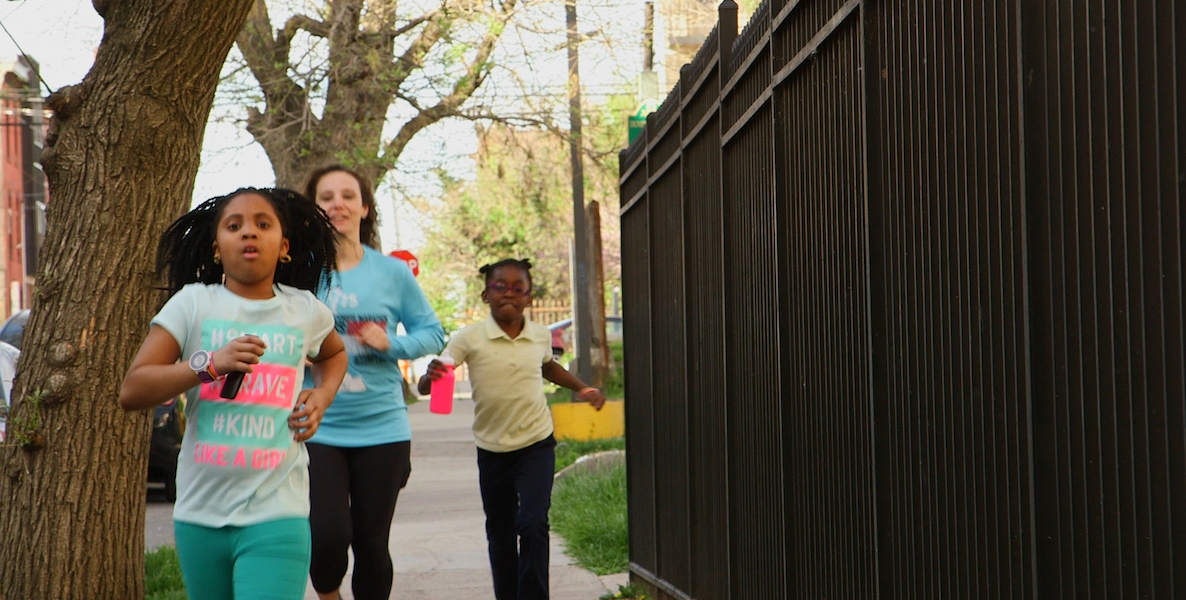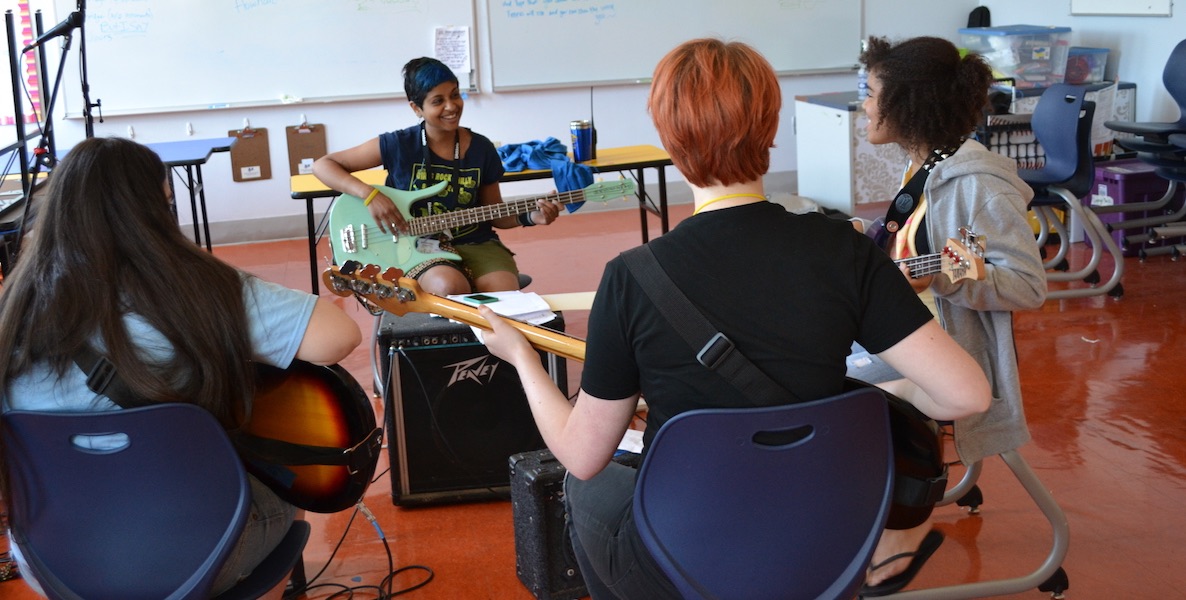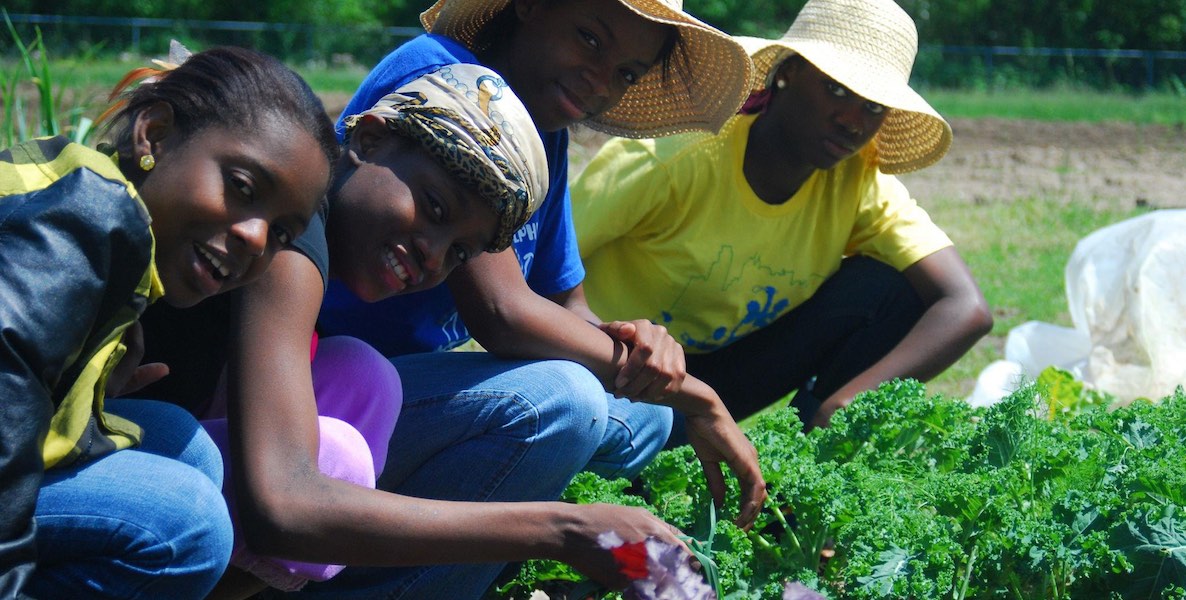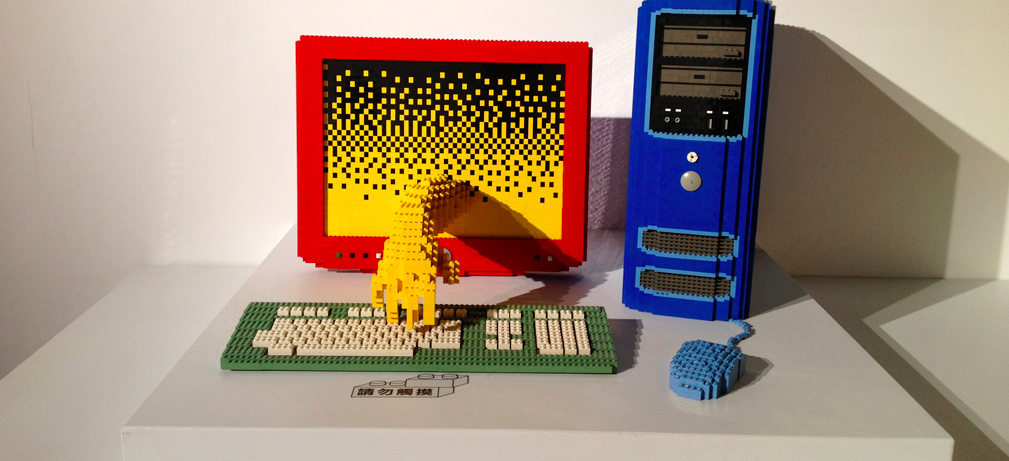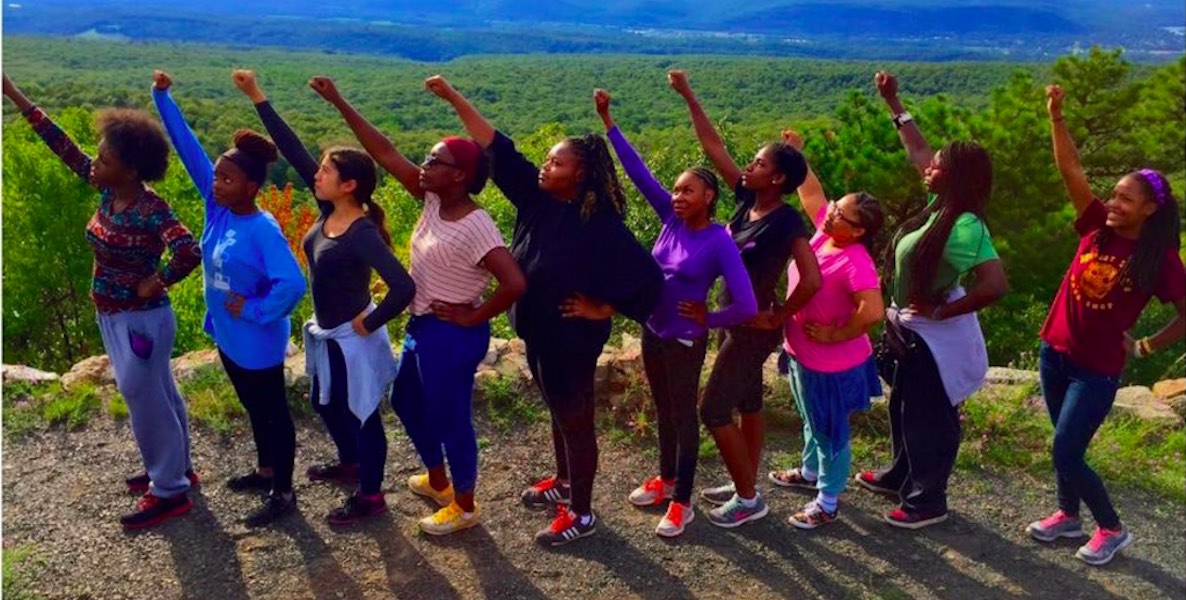We were gathered, twelve 13- and 14-year-old campers and two counselors, for a morning session on leadership and teamwork at Camp Sojourner when the conversation turned solemn.
“You can’t depend on anyone else,” one camper from Philadelphia said. “Everyone will let you down.”
Support Camp SojournerDo Something
It was a moving moment in a week of moving moments at Camp Sojourner, a leadership camp for girls that emphasizes appreciation of nature, healthy physical activity, art, and developing the skills that girls need to be in control of their lives and be positive members of their home communities. In addition to classic camp activities—swimming, singing, and outdoor recreation—campers every day participate in empowerment and team building activities, and spend the evening learning an art form of their choosing, including drumming, step, singing, creative writing, arts and crafts, theater, and woodworking.
Northeast Philly native Alisha Berry saw what a camp just for girls from the city could be. It could be affordable; run by women; culturally appropriate and comfortable for urban girls; intimate, diverse, accepting, and encouraging of open minds and critical thinking. “I thought, ‘I want Philly girls to have a camp like this,’” she says today.
Located at an environmental education center in rural New Jersey the camp primarily serves 8- to 16-year-old urban girls, some of whom pay as little as $5 to attend—something that sets it apart from other girls camps. The camp also serves primarily girls of color, though campers of all races and backgrounds are welcome. Camp Sojo—as it is affectionately called—is offered on a sliding scale starting at $350, with many families paying less than this and only 10 to 15 percent of the camp’s funding each year comes from families; the rest is from foundation grants and individual donations.
“We seek to be culturally and politically relevant to the girls and families who are part of the camp,” says the camp’s founder, Alisha Berry.
The camp opened in 2008, but the dream that created it began in the late 1990s when Northeast Philly native Berry was in her early twenties, and working at a girls camp in upstate New York called Camp Oh-Neh-Tah. She had worked other camps, but had been disappointed by them.
“I was shocked to see the ways gender dynamics impacted campers,” says Berry. “It was disturbing to watch [young girls] change in just a few weeks from curious, unselfconscious explorers to ‘girls’ who didn’t want to play sports because they didn’t want the boys to see them dirty or sweaty. I had never thought critically about race, class, gender, or heteronormativity before, but so many things happened at this camp which opened my eyes.”
But Berry says that Camp Oh-Neh-Tah showed her what a camp just for girls from the city could be. It could be affordable; run by women; culturally appropriate and comfortable for urban girls; intimate, diverse, accepting, and encouraging of open minds and critical thinking.
“It was such a breath of life, to see girls move in the opposite direction as a result of being at camp, more confident and exploratory and free to take up the whole spectrum of expression,” says Berry. “I thought, ‘I want Philly girls to have a camp like this.’”
Soon after, Berry moved to California, where she taught middle and high school math and English for eight years. When she moved back to Philly in 2005, Berry was more motivated than ever to make the camp a reality, along with Kandace Thomas and a colleague from Camp Oh-Neh-Tah. She visited several of the affordable local camps, but none of them felt like a good fit for what they had in mind. So they went about starting Camp Sojourner, eventually being accepted into the New Beginnings nonprofit incubator that allowed them to begin fundraising for the first summer camp. In 2008, they took 50 girls to camp, mostly funded through individual donations.
The economic crash a couple months later forced the team to scale back over the next couple summers. But this summer, 2016, Camp Sojo was back up to 75 girls over seven days. Staff receive only a small stipend for the week—most of us do it out of enthusiasm for the program—which allows Berry to operate the program on a small budget.
“I became more honest with myself and everyone around me,” wrote Tian, age 14, another of our sojourners. And Jai, age 13, noted that, “I feel that I am more bold and if someone were to try to silence my voice I’m able to say no.”
The program I co-led with artist and educator Kris Smith was typical of the type of learning that happens at Camp Sojo. Our group was charged with creating a scavenger hunt for the rest of camp that would highlight 10 women (mostly women of color) lost to history who made a positive effect on the world. The Sojourners—as campers are called in a nod to the camp’s namesake and to the “journey” they’re on—had been struggling to agree on which women to choose, at times putting down each others’ ideas and growing frustrated.
So we started an activity to challenge the Sojourners to see things from others’ perspectives. It worked: By the end of camp, these twelve Sojourners had planned a complex leadership and teaching activity. Standing in front of the rest of the camp as a unified group, they were stronger leaders and more compassionate people, who had made major strides in leadership skills like group decision making, active listening, and time management. And they’d learned to trust and rely on each other.
“I learned that being a leader means working hard for something that’s not all about me,” said LaLa, 13, in front of the assembled group of younger girls and staff.
“I became more honest with myself and everyone around me,” wrote Tian age 14, another of our sojourners, later. And Jai, age 13, noted that, “I feel that I am more bold and if someone were to try to silence my voice I’m able to say no.”
Campers every morning pledge to uphold Camp Sojo’s values: growth and respect, truth and love, courage and insight. But Berry’s vision for Camp Sojo extends far beyond one week every summer—it is a mission to instill in girls the confidence and skills to become successful in whatever they do outside of camp as well.
During the school year, Sojourners are invited to attend leadership programs designed to challenge their thinking, encourage them to become active citizens, and educate them on social justice issues facing their communities. These programs take the form of free arts classes, farming at Bartram’s Garden, or helping to educate others about the camp’s activist namesake through their annual Sojourner Truth Walk.
Stories about programs for girls and teensRead More
“We put girls and families at the center of our leadership structure,” says Berry, “serving on the board so that they are key decision-makers as our program grows, and encouraging former campers to become camp staff.”
For one longtime Sojourner, 16-year-old Gigi, the experiences at Camp Sojo have grown into a way of life, something she says she has taken with her into high school and beyond. Once shy, Gigi says she started attending the camp when she was 12 as a way to make new friends and get out of the city. Now a TLI camper, she stayed because of what she learned about herself, and about being part of an accepting community of women.
“I stayed with Camp Sojo because it’s full of loving people who are all about girls and young women changing up the world and breaking gender barriers,” Gigi says. “It’s a great feeling now knowing that I am a role model and a leader for the younger girls.”
Header photo courtesy of Camp Sojourner



